#media imbalance
Explore tagged Tumblr posts
Text
It's the media, stupid!
No, I'm not talking about specifics of various news media outlets or nitpicking about particular stories or attitudes. The problem is the vast overall state of the media environment in the United States.
Kate Riga is on target with her blog entry at TMP. (emphasis added)
Democrats Just Can’t Compete In This Media Environment
[T]here’s one leading factor that Democrats absolutely need to respond to as quickly as possible to avert this kind of electoral disaster in the future: the media environment unequivocally favors Republicans. We don’t have a ton of data yet, and much of it is partial. But we can already tell that Harris performed best — that is, underperformed least — in the battleground states. In the places where her campaign flooded the airwaves with her messaging, put her on TV shows and radio stations and in local newspapers, scattered driveways with information flyers, positioned her beside local celebrities, she improved on the repudiation of Democrats that infected nearly every other state. In other words: In the states where she set up a temporary but pervasive media apparatus, she negated some of the nationwide drag. That speaks to the reality that most of the country is awash in right-wing propaganda all the time. For the olds, it’s Fox News and conservative radio; for the youths, it’s the right-wing manosphere podcasts and streams that Trump so assiduously courted all campaign long (plus soothing TikToks promoting retrograde gender roles, evangelical values and distrust of government regulation — think the trad wives and crunchy so-far-left-they’ve-looped-around-to-the-right content — aimed specifically at women). It helps explain Biden’s prodigious unpopularity, despite passing a ton of legislation that not only polls well, but has meaningfully improved people’s lives. It helps elucidate the consistent claims that people don’t know what Harris stood for, before and after she released her policy proposals. It’s a playing field that Republicans not only dominate; Democrats don’t even compete. They still depend heavily on traditional media sources that simply don’t operate the same way these right-wing PR arms do. And we know that these forms of media are powerful; they reach tons of people, and are seen as useful enough pawns that Russia has invested in some of them. This isn’t a novel observation. The Obama alums who started Pod Save America and the greater Crooked Media family did so after Trump won in 2016 specifically to try to build up a Fox News of the left. There are structural problems with mimicking this right-wing content beat-for-beat. The Pod Save guys, while open about their political allegiances, often criticize the party and its politicians. It would be much more difficult to recreate the fawning adoration of Donald Trump Fox News and those podcasts produce for, say, Joe Biden on the left. It requires creativity and investment, but I think Democrats and those aligned with them could do it. Voters say over and over that they prefer Democratic policies — even Republicans often vote for them when they’re standalone ballot initiatives. It’ll require a cultivation of talent, a saturation of these spaces, finagling how to wrest back the counter-cultural bad boy persona from those who are espousing a way of life most people consider retrograde, confining, divisive and exhausting, not to mention solely in service of the plutocratic elites that run the party. Obama was such a revelation because he hijacked technology in a way that was new and exciting for people, and it helped him micro-target low propensity voters. Trump has since taken that mantle. In the two and then four years ahead, Democrats have to find a way to get in people’s eyes and ears, to figure out how to make an affirmative case in these spaces that people would likely respond to if they were exposed to it.
It's not just Fox News – which is bad enough by itself. There are the rightwing talk radio stations dating back to the 1980s. They joined Christian fundamentalist stations which had been pushing social conservative positions since the 1930s. And now there are countless bro types who talk rightwing shit for hours at a time on their podcasts.
Apart from Obama's skillful use of social media when it was still new, Democrats have fallen behind with digital media. Most recently, Elon Musk bought Twitter simply to use it as a propaganda machine. Facebook and its sister sites like Instagram use algorithms which promote rightwing talking points.
There had been attempts to set up liberal talk radio. But they have been sporadic and met with mixed success. Al Franken set up a liberal radio network called Air America Radio in 2004. But it had only modest reach on mostly medium powered stations and ultimately filed for bankruptcy during the Great Recession.
We need to increase our news and information footprint in a major way and on multiple media platforms – and fast. Obviously that takes money and business talent. So if you find yourself next to Mark Cuban, Bill Gates, or Michael Bloomberg on a flight or in an elevator, have your pitch ready. If that doesn't happen, we need to start raising money on our own. Nobody said that freedom is free.
#media#media imbalance#kate riga#news and information media#democrats#rightwing dominance in media environment#rightwing talk shows#air america radio#podcasts#election 2024
22 notes
·
View notes
Note
Marc's ego acting as a protective buffer post-sepang ties into how 'win at motorcycle racing' comes before 'old man dick' in his hierarchy of needs - and that flow is, for me, what keeps rosquez from just feeling horrifically upsetting as a ship even pre-sepang. In 2013-2014 marc is so young and down so bad that the power imbalance could get untenably icky if it wasn't also abundantly clear that his sense of self/self-worth are derived from racing and not vale's opinion of him. 1/2

literally he is defining himself as a rookie in relation to vale as a flirting tactic, not because it has an impact on his self worth, and that is what makes it awesome… idk vale looked at this insouciant lil 20 year old speedrunning all of his most controversial moves in the space of a few months in his rookie season and was like. omg he’s just like me !!! and then later on it was [much darker tone of voice] omg he’s just like me…
and then when they fell out marc went okay. and had enough sauce and gumption to not only ruin vale’s day specifically at sepang during the race (and the resulting head loss arguably cost him the title) but then proceeded to win the next four world titles in a row AND vale’s backyard track misano SEVENNN times, the first of which in the premiere class was in 2015. like i think you’re right, what makes it a successful ship is that marc inarguably matches his freak from talent to joy right down to his ability to stunt on people based on pure fucking spite and the terribly heartbreaking interplay between them BASED on that similarity is neigh unsolvable but DEEPLY sexy as a result
#like i think the power imbalance is sexy/interesting but it’s only interesting bc they BOTH have one on the other#vale as the guy w the legacy/media power and marc as the younger one w the talent to actually win it.#there’s a give and a take and marc is SO self assured in those early seasons and at least sports-wise beyond that it’s hot !!!#motogp#callie speaks#asks#marc also talented w media vale even old talented w the bike but. well they have found their wins in diff arenas these past ten years#like. aging as a prof athlete and being seen as the best ever and you’re not even that old but all your records are getting broken ALREADY#must’ve been very annoying. like the powerlessness of aging etc
26 notes
·
View notes
Text
If you can't handle me at my Willem x Rom you don't deserve me at my Yurie x Rom. 😔
#shitposting#personal#I am still bitter at that long term mutual who blocked me over willem x rom hcs post tbh ffhgkjv#and then vagueblogged about how fromsoft fans are such weirdos they want to-#-delete their from fanart so it isn't touched by us lol#why do you get into a fandom for media with dark topics and get baffled at dark content?#status imbalance and discomfort of manipulation is not even the worst thing these guys do#sir they kill mothers to abort and sacrifice their infants in this setting!#but teacher who is a bad person getting crazy over a student who 'actually listens' is worse?#sigh.....#additionally bitter because I LOVED their art and got excited over it#like if my mutual posted hcs that make me uncomfy I'd just unfollow or ask them to tag#again I am only overreacting because fromsoft games ARE horror#and full of bad people#but it isn't the first time someone is upset at really fucked up shit?#like remember the guy who told people that ship sulyvahn and aldrich while using-#-gwyndolin's corpse to 'explode'?#maam sulyvahn made a princess he usurped into a sex slave in this game!#these games have scary shit! maybe 'weirdos' are target audience!#fandomry rambles
18 notes
·
View notes
Note
MORE LAST BINDING TWEETS PLEASE, I BEG OF YOU GOOD SIR. I MOST CONSUME LAST BINDING CONTENT LIKE IT IS WATER AND I AM A FISH WHO HAS BEEN ROASTING IN THE SUN FOR THE PAST 20 MINUTES. I AM A CLOCK AND IT IS MY BATTRIES I NEED IT🥺💖
I’d make a joke about clocks and oak hearts or water and swans but I’m not smart enough to make it work so just take the tweets
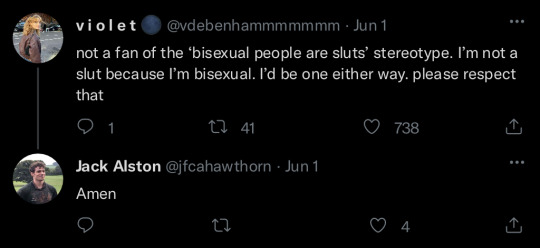
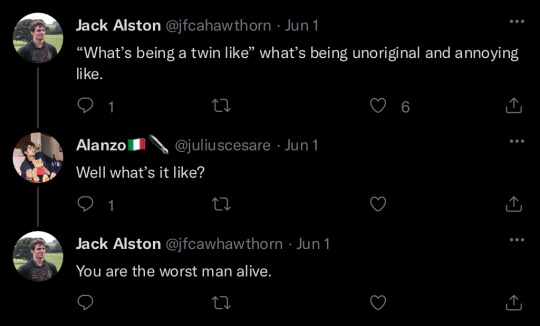

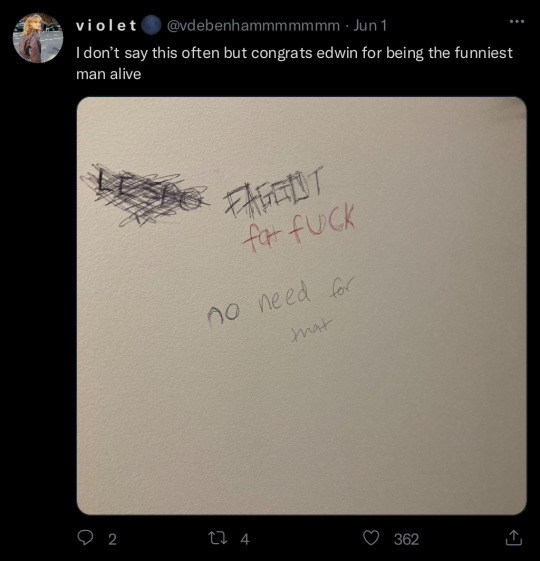
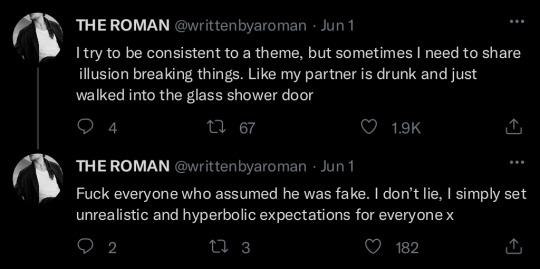
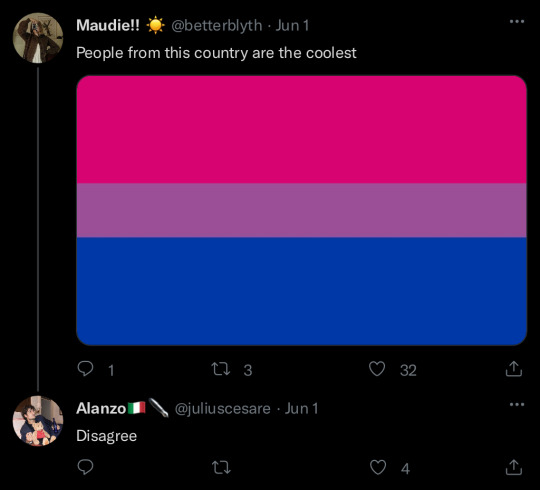
#sorry this took a sec I make these gradually until I have enough for a post#the imbalance is funny but we all know who’d be worse on twitter#my legacy will always be fake tweets apparently#alan ross#jack alston#violet debenham#robin blyth#maud blyth#edwin courcey#the last binding#the last binding trilogy#a marvellous light#a restless truth#a power unbound#freya marske#social media au
62 notes
·
View notes
Text
I don't have to say the trope. I love it. I need it. I breathe it.







#Bakudeku#kirimina#yuridetta#sylvix#awakening trio#I can't just pick one out of the trio they all gotta be fucking#childhood friends to lovers#childhood friends trope#'Bakudeku are soulmates platonically or romantically' They would literally be the 'friend' they tell their partners not to worry about#If you are wondering (or not at all wondering) why no fire emblem fates pairings when my tumblr was only fates posts for a year;#its because i hate retainer/lord ships become of the power imbalance; its one of my biggest icks across all medias#but yum your yums yummers and I'll yum my yums yummers
7 notes
·
View notes
Text
The issue of power is so interesting (or something) to see because yes, from an economic perspective Taylor undoubtedly has more sway -- she's one of the most famous people on the planet, she's a billionaire, her every move is followed, etc. So I can almost sort of understand the concern, in another scenario, where some people may expect that she could crush her detractors (For instance, I'm thinking about how Harvey W. silenced his victims as a Hollywood mogul, or how corporate titans silence whistleblowers which I feel are analogies some people may turn to. Or maybe we've all just watched too much of the Roys on Succession.)
I said this in the tags of a post the other day I think, but I think some of the discourse is kind of conflating power with platform. And yes, Taylor undoubtedly has a bigger platform, again by virtue of her fame and position in the media/industry. But part of that is that she's visible in these areas, and her presumed subjects aren't, of their own choice. If any of these subjects ever chose to spoke out, or make art based on their experiences, or pursue opportunities in the media/public eye, they would absolutely be given a platform for it. (Going way back, think of how JM used the media to give his side of the story through his music and his interviews after their split. And I'd argue he was probably way more public/direct about it than she ever was.)
If any of these people decided they wanted their side of the story out there, it would be and it would absolutely be turned into a story. (And arguably that may already be starting but that's a whole other thing.) And this is just my opinion, but given that the subjects of these topics are often privileged white men, I'd argue that their sides tend to carry (more) weight regardless of their economic status in relation to her. If JM or JG or JA or HS wrote a book or a song or a script about their experiences, even only insinuating about her, it'd be the conversation. And not to be a cupcake about it, but the media seems to always want to find something to knock her down a peg about (which, sure, journalism's job is to hold people accountable, but that's not what always happens here and we know it), so they would absolutely give this the time of day, if they chose to put anything out there.
The thing is, I do see in a superficial way that there is there is a clear difference in their socioeconomic/celebrity status, and perhaps that's perceived as a power imbalance, but that's implying that she's dictating a whole host of entities out of her control, and I just don't think she holds the sway of those that some feel she does. Don't get me wrong, she's absurdly wealthy and has influence, but so do so many other people around her, including those who don't support her. (That's the wrong word for it, but I just mean, people who aren't in her circle/sympathetic to her.) And as I've posted about so so so many times before, THESE OTHER PEOPLE (men) ARE WEALTHY AND IN THE PUBLIC EYE TOO. They are all in careers that entail celebrity and involve their own influence in the media. These are not shrinking violets in private civil life who are like, grocery store checkout clerks. They're actors and musicians and media personalities who play the same game. And even the "poorest" of these subjects for the most part are millionaires who are far, far wealthier than any of us will ever be in our lifetimes. They may choose to stay off of social media or the press when it suits them, but they could absolutely make art or give interviews about their experiences and they would command their own kind of influence. (I'd also argue that they would be given a platform thanks to Taylor's platform, but that's another thing.)
I don't want to dismiss the influence of her wealth and stature in the entertainment industry, and I feel like that's kind of where the perceived "imbalance" comes from, but to be frank, I feel like if any of these other subjects spoke out, the media would be so quick to raise their stature in the press for the sake of clicks/controversy/what have you. Critics claim that Taylor can crush any story or person who goes against her, but I think given the breadth of stories out there about her at any given time (the NYT op ed, the jet stuff, the DM stuff, etc.) I don't think that's true; I think the publicity/clicks outlets get for covering stuff, even if salacious, outweighs any concerns over upsetting her or burning bridges. (Not saying that may have not happened, but... I think it would be more obvious if it were a regular occurrence these days.) If anything, 2016 through rep kinda proves that she doesn't have the "control" of the media that some claim she does.
But most importantly, THE ALBUM ISN'T OUT YET. WE DON'T KNOW WHAT THE LYRICS ARE. Taylor gets accused of writing diss tracks, but she rarely does, and I don't think she's written an outright callout song since her Fearless/Speak Now days when she was a teenager/very young adult. Just about everything since Red on has been about her own feelings, experiences, etc. and not a literal "you did x and y and z and you're stupid and i hate you" song. She's not calling people out by name, and truly only chronically online fans are going to deduce who songs are about; five years from now, people discovering the music will just know they're bops (or depressingly sad breakup songs, as the case may be).
I don't know where I'm going with this, i'm talking in circles, it's just interesting how things are being interpreted or assumed so far. I fully acknowledge I'm a cupcake so I'm generally not going to jump to the worst conclusion about Taylor, but there's also curious sociological/gender stuff happening in these conversations. I absolutely think that if the roles were reversed and her exes were billionaire household names and she was an indie artist, nobody would ever talk about power dynamics. I think it's all moot because like so many people have said, I don't think the album is going to be what some think it's going to be, and I think it's going to be way more introspective/vulnerable/dark than what they assume a breakup album is going to be, though obviously I don't know anymore than they do. It's just funny because you never hear about this with other people. (Like, was there a big fuss when Kelly Clarkson wrote a breakup album about her ex-husband? I know she's not as wealthy as Taylor and her ex was probably wealthier than Taylor's exes, but she's someone with sway in the industry and is on TV everyday, but everyone kind of said "lol her ex was a jackass wow she writes sad banger ballads" and moved on.)
Anyway I don't want to start shit or anything, but I'm just giving my two cents about my observations of the whole media landscape stuff.
#my personal bug bear is some faction painting J*e as a poor street urchin who was plucked from obscurity hunger games-style#yes his life undoubtedly changed from associating with her but HE'S AN ACTOR WHO'S BEEN IN OSCAR-NOMINATED FILMS#HIS FIRST MOVIE WAS WITH AN OSCAR-NOMINATED (winning?) DIRECTOR!!#I'm not shitting on him or anything in this case -- I'm saying he was pursuing a career in a very high profile industry himself!#it may not have panned out for him like he'd hoped or planned but as far as we know it's still what he's pursuing#he comes from a privileged background that i'd argue mirrors taylor's own pre-fame#and even now (thanks to royalties) will be financially secure for life#he's not the most famous man in the world but if he decided he wanted to speak out he would be for 15 minutes#and the media would absolutely eat it up and i'd even argue give his side more weight than his 'power' would indicate#i'm not saying he should or needs to but i'm just saying he's not powerless in this situation#also putting this in tags but it seems in private there was often a power imbalance in her relationships & not in her favour iykwim
8 notes
·
View notes
Text
every time you think i’ve hit rock bottom fr i’ll think of smth else to make it worse(im getting into star wars)
#that’s half true bc ill only be watching stuff relevant to obikin#bc i need old men yaoi or ill die#i love you age gap ships#i love you power imbalance#i love you master/student trope#i love you psychosexual shenanigans#sometimes the good stuff is in media made from and for white men that’s unintentionally gay
13 notes
·
View notes
Text
some people ask for toxic yuri and then when you put the poison under their nose they're like wtf this could kill somebody
#like yeah that's the point! peace and love :3#this is abt that post where its a bunch of tiktok comments of ppl being like omg toxic yuri has ppl hating each other and power imbalances!#LMFAOOO that's right. that's exactly correct#luniaisun#end sanitization of media and self censorship and dumbing down our language to pass censors neowwwwww
2 notes
·
View notes
Text
10 characters from 10 fandoms!
tagged by @abubblingcandle and @kvetchinglyneurotic who are both so ridiculously talented as writers and SO ridiculously lovely as people that i am forever building metaphorical statues in their honour and tossing roses at their feet as they bow on the stage
Jamie Tartt (Ted Lasso)
Dick Grayson (DC)
Neal Caffrey (White Collar)
Prince Zuko (ATLA)
Peter Parker (Marvel Comics)
Morpheus/Dream of the Endless (The Sandman)
Buffy Summers (BTVS)
Spock (Star Trek)
Westley (The Princess Bride)
Donna Noble (Doctor Who)
I HAVE NO IDEA WHO HASN'T BEEN TAGGED!! (AGAIN!!) going to boop with no pressure @nativestarwrites @sighonaraa @fanficfanattic @orbitalpirate @anguishmacgyver @jamiepoptart
#thanks for the tags beloveds!#i suddenly forgot every character i've ever loved from every piece of media i've ever seen WOW#oh god the gender imbalance here is. bad.#am i a bad person?#(shakes you) AM I A BAD PERSON?????#tag game#you know what's FUNNY?#i have posted by job and my general location and the NICKNAME MY FRIENDS CALL ME on here#and yet i think this is the most incriminating bit of real-life evidence#several people in my life could CLOCK ME via this list#what does that say about meeeeee???#(shakes you harder) AM I A BAD PERSONNNNNNNN?????????
6 notes
·
View notes
Text
I can outrageously misunderstand things in ways you could never imagine
#I bet you can imagine#I think it's strange in media when character A goes “I love you more than you'll ever know” or stuff like that#because character B loves you back that same amount???#and if they DON'T there is an imbalance in the relationship#understanding is key#fine I'll stop being aroace on your smut fics
4 notes
·
View notes
Text
DINNER!
P-P-P-P-Put him in a rot cage! Scumbag!Eat shit bitch! You look fuc-king divií̷̹̌̆n̷̫̰͊͝e̸̢̦̝̻̥͓̳͛̾̋ͅ!
Put him in a hard place! I scratch your back! In re-turn, you peel off mḭ̸̹̒͗͗̅̕͝n̸͉̳͊̒͗̾͑̕͠ͅe̷̢̟͓̗̲̥͂̌͘!
I-I-I-I spit teeth on your grave! You just talk shit online! I-I-I-I.C.U on payday! Try to grow a spine!
S-S-S-S-Sycophant cyclical hyper-digital! Spiders shooting out of your guts! Apartment typical! A part of you that re-fuses not to suck!
I bet you fe-el just gre̴̮̞̖̼̮͚͂̔̎͘͝͠á̵̼̘̼̍́t̵̨̤̦͓͙̍ͅ! Well I feel sublḯ̴͈͈̈́m̶͕͊͠e̶͕̳͈̅̐! Rusted fingers through the grate! Telling me you’re all mine!
Y-Y-Y-Your head is on my hotplate!! P-Paired with a glass of wine-wine-wine!! In water up to your neckk!! You’re running out of time!!
I-I-I guess I got my hopes up I'm just his cash-to-make
Bo-Bo-Born inside a test tube I-broke-the-glass and ran away
Eat. it. it. is. good-for-you I assure you that there's more com-ing your way! Nothing much left to do except fuck it up in every sin-gle way!
I hope you like it! I put my heart inside it! No mat-ter what we do we all end up on someone elses plate!
(̶I̷’̴m̸ ̶a̷t̷ ̸a̸ ̵c̷a̵n̶y̶o̶n̶ ̵w̸i̵t̵h̸ ̶m̷y̴ ̴a̶s̶s̶ ̶a̴n̵d̷ ̷d̸i̴c̸k̸ ̵o̷u̵t̶)̶
#tw power imbalance#tw manipulation#cannibalism metaphor#dishonesty#facades#social media#online#hatred#song lyrics#femtanyl#DINNER!#Spotify#metaphors
6 notes
·
View notes
Text
If I see one more person say that Hector deserved or wanted what Lenore did to him, I’m going to steal every left shoe in their house
#netflix castlevania#hector castlevania#please learn how to think about media#I get it. Lenore is pretty#but she’s also the most manipulative character on the show#she straight up treated Hector like a dog#then deliberately used the power imbalance between them to benefit her#I don’t see y’all saying that crap about Alucard#y’all lose any and all compassion for male victims when their abuser is a hot woman#fandom wank#I guess?#I’m listening to people talk about Billy and Karen all over again#ugh
10 notes
·
View notes
Text
They're just playing pretend, right? Certainly Toei wouldn't commit an even deadlier sin than H*gtto did, RIGHT?!

RIGHT?!?!?
HiroPre's 40th Ep. (November 12th): Great Friends ❤ Eru-chan's Wedding ⭐
Synopsis: Suddenly, Eru-chan says: "I wanna marry Tsubasa!", so the others decide to organize a "pretend wedding" for her. But even after the play is over, Eru won't let go of Tsubasa's hand.
Look, I know what "playing pretend" is, but considering what happened 5 years ago, I cannot help but feel scared for how things will eventually turn out.
If what I think is happening IS happening...
...it better not be.
#magical girl#as you all can see: h*gtto has scarred me for life.#japanese media has cultivated quite the reputation with age gaps/power imbalances...#on november 12th i will either sigh in relief or off myself.
3 notes
·
View notes
Text
Writing Lan Sizhui and Jin Ling fighting alongside each other is everything oh my god this is SO fun??????
power couple honestlyyyy 💞⚔️✨
#this is also a queued post bc I’m writing it rn lmaooo#and it’s like 2am#both of them are canonically incredible at combat so there’s no really no imbalance of skill between the two#I’ve read some things about them where JL is headcanoned as an ‘uwu soft boy’ who can’t even lift a sword#and im just sitting there like#did we consume the same media???? LMFAO#idc how small he is he’s a badass tbh#marksmanship on point#swordsmanship lit#martial arts DOWN to a T and a quick learner as proved in canon so like?????#do NOT underestimate and water down my son pls he can hold his own fr#👊👊👊#apple babble 🍎#fic musings#toss a queue to your witcher
4 notes
·
View notes
Note
hi! not original anon about Mike BUT I do love him. I’ve spoken to Mike a few times for a while and he seems to be a really good dude. I’m not inclined to share exactly what Mike said, but it sounds like he came into Brendon’s life when Brendon really needed it, and helped Brendon sort of see things differently, and he’s happy now. And for various reasons, I don’t think Mike has taken advantage of Brendon at all.
Well then that’s phenomenal! I’m glad! This could also be Mike Viola ghostwriting but I’ll choose to believe it isn’t 😂 look, I really don’t mean any harm whatsoever to Mike, nor do I care that much (only because it’s none of my business). My other answer to why I dislike him was going to be “he doesn’t even play the viola,” but I only gave a more serious answer to assuage anyone’s fears that my distaste was rooted in anything worse than personal preference. He certainly doesn’t kick puppies or hate homeless people or anything to my knowledge. At the end of the day, it’s not something that affects me, and I do support anything that’s ultimately beneficial for everyone involved. I do appreciate you offering your perspective and also for being nice about it 😅
#I’m so unbelievably nosy; I need to know what you guys talked about 😂#drop into my dms 👀😂#that’s a joke; please keep things to yourself if that’s what you’re comfortable with#look. like I said before I’m sure nothing serious is happening#if anything#but when I see a private friendship cross into the public space; I get skeptical#again I know that’s how the industry is but that doesn’t mean it’s right or healthy all of the time#you just shouldn’t blur professional and personal boundaries more than necessary if it can be avoided#that’s not sustainable#and this ask doesn’t make me feel much better because if Mike was there when Brendon needed him then#A. that’s another power imbalance#and#B. that’s setting up the foundation for codependency#just my spidey senses is all#it’s not this relationship specifically; it’s a pattern of events I’ve seen irl and in the media#asks
2 notes
·
View notes
Text
i guess with the persona trailers dropping, anime and video game rp tags are gonna just be genshin, that honkai shit, and persona. :| yay.
#🌙 OOC! THE CROWN GLITTERS ON AN EARTH SIGN.#/ im not even a hater fr but u'd think with all the media out here we'd get some variety or some shit.#/ u would think only like 5 games exist in this whole world and they're all dweeb shit with the imbalance.
3 notes
·
View notes